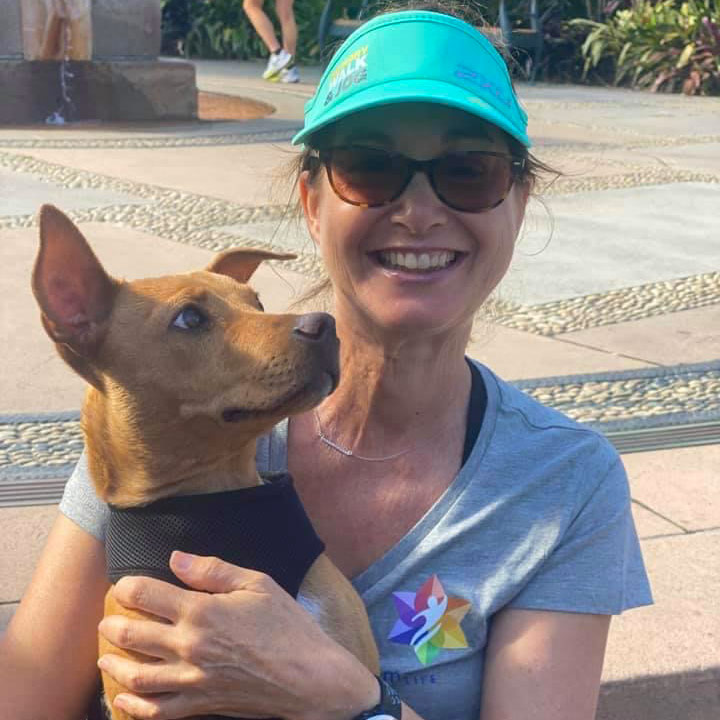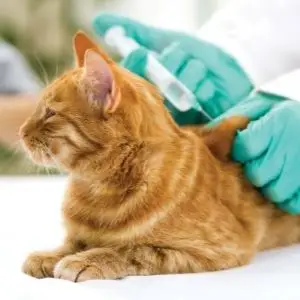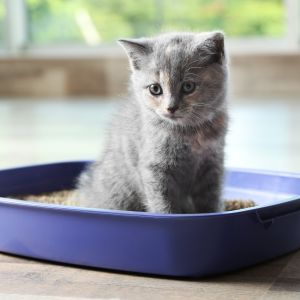Kitten development stages
Kittens progress through 5 distinctive stages as they grows into adulthood, and each has its own specific growth milestones, as well as some predictable behaviours. In other words, a kitten’s developmental stage heavily influences how they act and what they do.
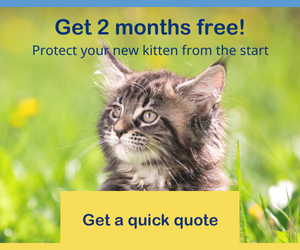 This can be very helpful for new kitten owners, because knowing what to expect makes it just a little easier to raise them and provide what will benefit them at any point in their young lives.
This can be very helpful for new kitten owners, because knowing what to expect makes it just a little easier to raise them and provide what will benefit them at any point in their young lives.
Additionally, having a clear understanding of the kitten development stages can help you negotiate some of the more challenging periods you will most likely encounter during your kitten’s first year!
Click on the stage that corresponds to your kitten’s age to learn what to expect now and in the weeks ahead:
0 – 2 weeks: |
Neonatal stage |
2 – 4 weeks: |
Transitional stage |
4 – 12 weeks: |
Socialisation stage |
3 – 6 months: |
Juvenile stage |
6 – 12 months: |
Adolescent stage |
Neonatal Stage (0-2 Weeks)
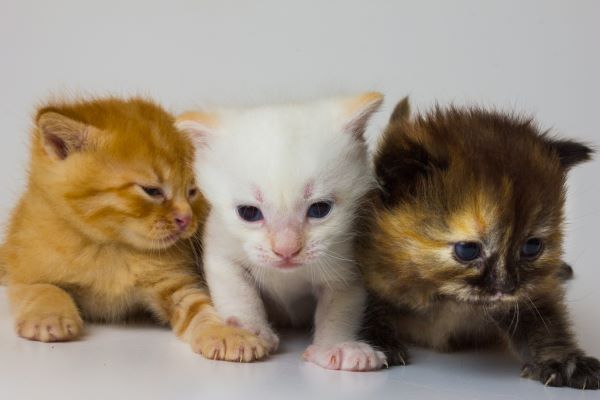
Newborn kittens are defenseless, blind, and can fit in the palm of your hand. At birth, their eyes closed, their ears are folded, and they are toothless.
During the brief neonatal phase, kittens are completely dependent on their mother, needing to be close to her for food, for warmth, and for comfort. At this stage, besides frequent nursing, expect your kitten to sleep a lot, because eating and sleeping are their two main activities in these early weeks.
Physical development
- At birth, they are able to hold their head up and move by wiggling their limbs.
- Their eyes are opening and are blue in colour; they are usually open by two weeks and they look around a bit.
- By 2 weeks of age, their ears are small and rounded, and they are learning to orient toward sound.
- They start taking their first wobbly, uncoordinated steps.
Social and behavioural development
For the first few weeks of their lives, kittens need to be with their mother and littermates. As well as for their comfort and feeling of safety, this is essential for their social development. They learn how to interact with other cats as well as how to inhibit their bite from their mum and siblings. If they are removed too early, it is very difficult for them to learn these and other important skills, and they may exhibit aggression toward people and other pets, including other cats.
Neonatal kittens will not yet be playing, and will spend the majority of their time sleeping. The main task of those responsible for kittens during this stage is to keep their living area clean and warm. . If they must be handled for any reason, do so briefly, and with the utmost gentleness. By two weeks of age, kittens may start to show some curiosity about the world around them.
Transitional Stage (2-4 Weeks)
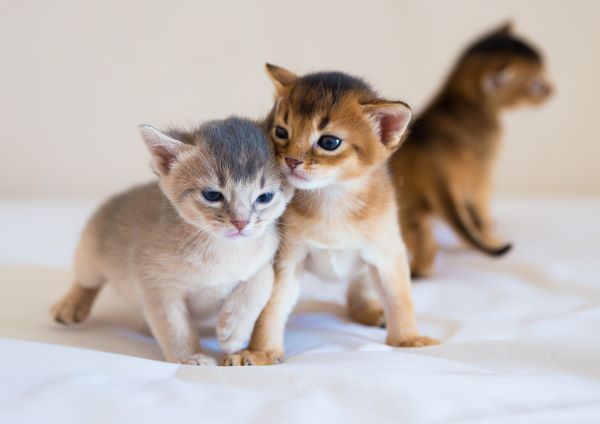
Physical development
- By the third week, kittens are walking, their sense of smell is well-developed and they can see well enough to find their mother.
- Their ears are pointing up and their incisor teeth are growing in.
- By the fourth week, their sense of smell is fully mature and their hearing is well-developed.
- They can walk fairly well, their canine teeth are erupting and their claws become retractable.
Social and behavioural development
At three weeks of age, kittens will explore their surroundings, including the litter box. They may become curious about cat toys, though they are not yet able to run or chase after moving objects.
At four weeks, kittens are exploring confidently and developing more coordination, allowing them to walk, run, and even begin to play. With their improved senses, they are notably more responsive, make frequent eye contact with caregivers and react to sights and sounds in the environment. They start to interact with their littermates, play with toys and use the litter box. Competition for rank and territory begins.
Socialisation Stage (4-12 Weeks)
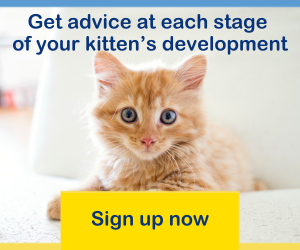 As the name of this stage suggests, now is the most critical period for socialisation in the kitten’s life. Socialisation is a process of positive exposure to various stimuli that help a domestic pet be more prepared for life in a home with humans and/or other animals. The key is to provide lots of positive experiences for your kitten with all sorts of new experiences and situations. This includes people, dogs, other cats, common sounds and objects inside and outside the house, different types of walking surfaces, and a variety of smells.
As the name of this stage suggests, now is the most critical period for socialisation in the kitten’s life. Socialisation is a process of positive exposure to various stimuli that help a domestic pet be more prepared for life in a home with humans and/or other animals. The key is to provide lots of positive experiences for your kitten with all sorts of new experiences and situations. This includes people, dogs, other cats, common sounds and objects inside and outside the house, different types of walking surfaces, and a variety of smells.
Scientific evidence suggests that early exposure to other cats, humans, and a variety of environmental stimuli can benefit a cat’s social behaviour and overall cognitive development. Socialisation helps kittens develop positive associations with many things they will encounter throughout their lives. Their brains are better able to accept new experiences and situations as normal than at any other period, and during this stage, just a few positive experiences can be very influential in teaching cats to be okay with something now and for the rest of their life. On the other hand, skills not acquired during this stage may be lost forever.
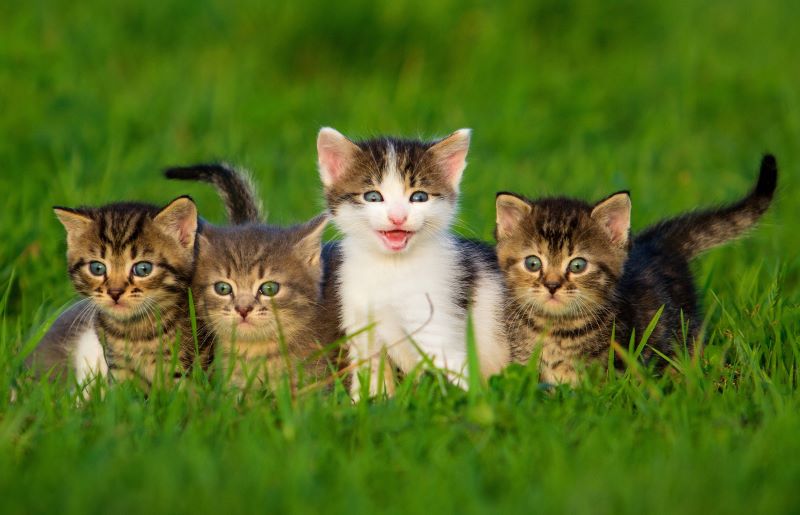
Physical development
- By the fifth week, their sight is fully mature and premolar teeth are emerging.
- They are running and playing confidently, their grooming skills are improving and they have perfected their use of the litter box.
- They can right themselves, run confidently, place their feet precisely, avoid obstacles, stalk and pounce, and catch “prey” with their eyes.
- By the sixth week, their vision and hearing are fully developed, and the molars are growing in.
- They are coordinated enough to jump off low furniture and land on their feet.
- By the seventh week, all their baby teeth have grown in, their eye colour is changing from blue, and males’ testicles may begin descending.
- By the weeks 6 to 7 they begin to develop adult sleeping patterns, motor abilities and social interaction.
- By 8 weeks, they are looking like miniature cats, and their eyes are their adult colour.
- They are energetic and independent, and their agility and coordination are nearly fully developed.
- They are weaned but may continue to suckle for comfort as their mother gradually leaves them more and more.
- They are ready to be adopted into their new homes.
Social and behavioural development
Five-week-old kittens are typically developing social skills with humans and other animals. Most of their learning is by observation, preferably of their mother. Ideally, kittens should stay with their mother and littermates, or other role-model cats, for the duration of this stage, because this is when they learn how to be a cat. They are also exploring the ranking process and learning who’s in charge.
By six-weeks, kittens are socializing confidently with their littermates, play-fighting, pouncing, and defending themselves. Play is another essential part of socialisation, helping to improve both their physical coordination and social skills. They are curious about their surroundings and eager to explore, and they are perfecting their grooming skills on themselves and each other.
Around seven weeks, kittens experience a spike in energy. Their sleep time decreases and time spent playing increases. They are able to run, climb cat trees, and confidently jump off of furniture.
Kittens that experience more exposure to multiple humans early in life are more social and less fearful that those who have less exposure.
Juvenile Stage (3-6 Months)
Kittens at this age show increasing energy levels and more curiosity about their world than before. They tend to explore more, climb all over the place, and do more leaping around, including from one high spot to another. They are becoming more independent, and are most influenced by their “litter” or playmates, who now include companions of other species. They are beginning to see and use ranking (dominant and submissive) within the household, including humans.
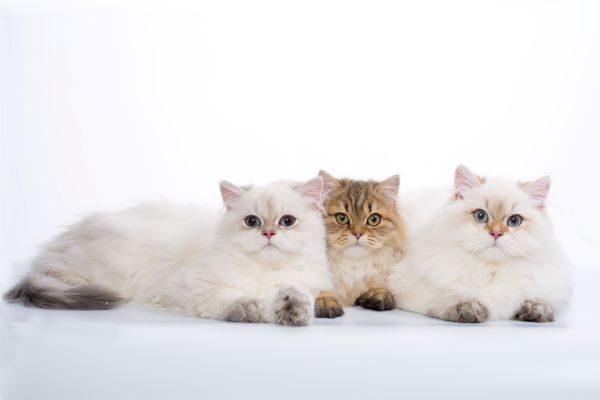
Physical development
- By 3 months, kittens have all their baby teeth, which will begin falling out. Teething occurs.
- From 3 to 6 months, their body shape starts to fill out and they become leaner and more muscular.
- At 4 months, they have an intense growth period, their appetite increases and they expend boundless energy.
- From 5 to 6 months, their growth rate begins to slow down, although some large breeds can continue growing up to one year.
Social and behavioural development
Kittens in the Juvenile stage like to explore new areas and investigate anything that moves, and enjoy batting at, pouncing on and biting objects that resemble prey.
Play provides young cats with opportunities to practice skills they would normally need for survival. At this stage, they continue having a huge interest in play, both object play and social play. Their object play often looks a bit like predatory behavior, and their social play may resemble fighting. Engage your kitten in lots of play and allow them to play with other cats in the house, as long as everyone is having a good time and it doesn’t get out of hand.
Kittens at this stage also need lots of enrichment in the form of physical and mental exercise. Interact with them a lot and give them opportunities to play with any other gentle social members of the household. Provide them with ways to explore the house with high perches and kitty condos. Teach them to walk on leash if you plan to make such excursions a part of their life. Provide scratching posts and lots of toys to keep them entertained and occupied.
Adolescent Stage (6-12 Months)
At this stage in their lives, kittens are transforming from kittens into cats, and new behavioural developments often take their owners by surprise. These changes seem to happen very quickly, so expect the unexpected as your kitten matures during this stage. You may still expect kitten-ish behaviour when more adult-like behaviour takes you be surprise.
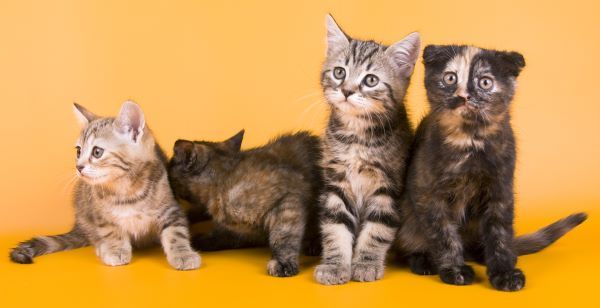
Physical development
- By 6 months, the major developmental milestones may already have passed.
- They look like little adults, although not yet filled out, with lanky legs and torsos.
- They have most of their adult teeth (which grow in near the baby teeth, so these don’t always fall out in the process!)
- They should be fully vaccinated by now.
- They have reached sexual maturity, and can be spayed or neutered. If not, they experience the beginnings of sexual behaviour (females can become pregnant as young as 6 months).
- By 7 months, they will start to sleep more during the day, just like an adult cat.
- By 9 months, all baby teeth should be gone and all adult teeth should be in.
- By 10 months, they are able to transition slowly to adult cat food.
- By 12 months, they are considered adult cats.
Social and behavioural development
 Just like their human counterparts during the adolescent period, kittens become a lot more independent. They are more adventurous and confident to freely explore their environments and voluntarily play with other existing pets and you. They often have stronger preferences about which toy to play with, where to rest, and what treats or other types of food are worth eating. They may push items around or off of tables out of curiosity, and it will test the limits of both human and inanimate objects.
Just like their human counterparts during the adolescent period, kittens become a lot more independent. They are more adventurous and confident to freely explore their environments and voluntarily play with other existing pets and you. They often have stronger preferences about which toy to play with, where to rest, and what treats or other types of food are worth eating. They may push items around or off of tables out of curiosity, and it will test the limits of both human and inanimate objects.
They have a teenage attitude and will decide whether they want to be sociable and in the mood for physical contact from you, and if so, may start to snuggle with you voluntarily. They experience a heightened exploration of dominance, including challenging humans. Adolescent temperament and behaviours don’t necessarily stop with physical maturity, and a one year old cat is the feline equivalent of a human teenager!

